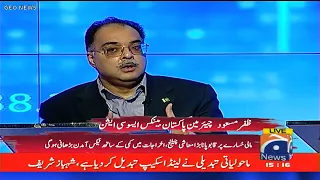Zafar Masud with Shahzeb Khanzada on Great Debate Geo News
Banks Seek Wider Data Access for Financial Inclusion on Geo TV’s Great Debate
Karachi, Pakistan – In a recent episode of Geo TV’s Great Debate program, a heated discussion arose between Chairman of the Banks Association Mr. Zafar Masud with Shahzeb Khanzada, the show’s host, regarding data access and financial inclusion.
Zafar Masud with Shahzeb Khanzada argued that data is the “new gold” and essential for expanding financial services. He advocated for banks to have full access to citizens’ bank account information, claiming the association has no concerns about data privacy.
Khanzada challenged this stance, highlighting the distinction between National Database and Registration Authority (NADRA) data and bank account information. He pointed out that access to NADRA data, which is a government-held database containing basic citizen information, differs from access to sensitive financial information held by banks.
See also: Transitioning Away from a Cash Economy
The debate of Zafar Masud with Shahzeb Khanzada intensified as Masud expressed frustration with the current data access limitations. He challenged Khanzada to try to extract data from various sources, including the Pakistan Telecommunication Authority (PTA) and electricity distribution companies (DISCOs), suggesting a reward for success.
Khanzada countered by raising concerns about the practicality and cost of such widespread data access for banks. He questioned the feasibility and potential financial burden associated with acquiring data from diverse sources.
The discussion of Zafar Masud with Shahzeb Khanzada underscores the ongoing debate in Pakistan regarding data privacy and its impact on financial inclusion. While banks argue for wider access to facilitate service expansion, concerns linger about potential misuse and the need for robust data protection measures.
Great Debate on Geo TV Heats Up
Banks Clash with Data Privacy Concerns
A recent episode of Geo TV’s Great Debate of Zafar Masud with Shahzeb Khanzada transformed into a captivating discussion about the critical issue of data access and its impact on financial inclusion. Mr. Zafar Masud, ignited the debate by proclaiming data the “new gold” for financial institutions. He passionately advocated for unrestricted access to citizens’ bank account information, confidently asserting the Banks Association’s unwavering commitment to data security.
However, Shahzeb Khanzada, the show’s host renowned for his incisive questioning, wasn’t swayed. He meticulously dissected the crucial distinction between readily available National Database and Registration Authority (NADRA) data, containing basic citizen information, and the highly sensitive financial data held by banks. Khanzada’s sharp analysis underscored the potential pitfalls associated with granting unfettered access to a citizen’s financial fingerprint.
The debate of Zafar Masud with Shahzeb Khanzada escalated to a point of high tension as Masud’s mounting frustration with current data access limitations became evident. In a dramatic attempt to drive home his point, he issued a flamboyant challenge to Khanzada. Masud dared the host to try to obtain data from a range of disparate sources, including the Pakistan Telecommunication Authority (PTA) and electricity distribution companies (DISCOs), even offering a lighthearted reward for success.
While acknowledging the potential benefits of wider data access for banks, he raised critical questions about feasibility and cost-effectiveness. Mr. Masud meticulously outlined the potential logistical nightmare and the significant financial burden associated with acquiring and processing data from such diverse sources, each likely having its own complex data governance structure.
This exchange of Zafar Masud with Shahzeb Khanzada served as a microcosm of the intricate relationship between financial inclusion and data privacy in Pakistan. Banks view wider data access as a key to expanding financial services, particularly to the vast unbanked population. However, the specter of potential misuse of sensitive financial data and the lack of robust data protection measures in the country remain major concerns for many citizens.
The fiery debate of Zafar Masud with Shahzeb Khanzada sparks a reactions among the listeners, with viewers divided along distinct lines. Some echoed Masud’s sentiments, arguing that greater data access would not only facilitate financial inclusion but also fuel economic growth. Others, aligned with Khanzada, expressed deep anxieties about data security breaches and the potential for discriminatory lending practices based on the newly acquired financial information.
The discussion of Zafar Masud with Shahzeb Khanzada on Geo TV’s Great Debate served as a springboard for a larger national conversation in Pakistan. It’s clear that Pakistan needs to navigate a delicate path, striking a balance between promoting financial inclusion and safeguarding citizens’ data privacy.
Achieving this balance will necessitate open dialogue, collaboration between banks, regulators, and consumer protection advocates. Crucially, the country might even need to consider legislative revisions to create a robust data protection framework that fosters trust and innovation in the financial sector while safeguarding the privacy of its citizens.
This framework should ideally encompass:
- Clearly defined data collection and usage practices: Banks should be transparent about the data they collect, how it’s used, and with whom it’s shared.
- Strong user consent mechanisms: Citizens should have clear control over their financial data and be able to easily grant or revoke consent for its use.
- Robust data security measures: Banks must invest in state-of-the-art security infrastructure to protect against data breaches and unauthorized access.
- Independent oversight and enforcement: A dedicated regulatory body should be established to oversee data protection practices and enforce compliance.
By establishing a robust data protection framework, Pakistan can create an environment where both banks and citizens can thrive. Banks can leverage data responsibly to expand financial inclusion, while citizens can trust that their sensitive financial information is secure. This, in turn, can pave the way for a more inclusive and prosperous financial sector in Pakistan.
